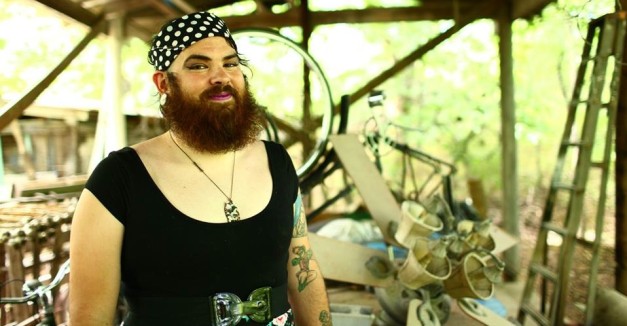When Lincoln emcee Phoebe Dro takes the stage, she doesn’t use her forceful delivery just to entertain. She aims to open eyes and to teach, carving out her place in a hip-hop tradition that goes back decades.
“I feel that rap is for people who have a lot to say, but right now is just saturated with people who have nothing to say,” Dro says. “I definitely write with the intention of making you think.”
Dro calls her music “hip-hop with a punk soul.” Her style touches genres from metal to house and she brings personal weight to lyrics of social justice and freedom. She performs her established catalog of songs at Indigo Bridge with Shout Mountain this Friday (RSVP here).
Dro has played music since age 10, when, still living in her native Kentucky, she was mistakenly gifted a guitar meant for her brother. They shared while she learned to play, and by high school she was a guitarist in metal bands.
She played punk after graduating in 2006, and her further musical development overlapped with travel. As she explored different states and eventually moved to Nebraska, she spent time as a dubstep producer and started crafting beats for emcees. However, her would-be collaborators were slow to finish their verses. Impatient after what was often months of waiting, she decided to rap on the tracks herself.
Those songs led to working with other producers and eventually to the Straighten Up and Die Right mixtape. The record, 11 tracks of melodically rich beats and strong lyricism, features solo cuts and songs with other artists, like Lincoln vocalist Gina Harvey and fellow Lincoln producer/emcee Kamakauzzy.
Dro’s move to Lincoln was unplanned. She was couchsurfing around the country in 2012 when, while waiting in Chicago for a bus to Des Moines, her host in Iowa fell through.
At a loss, she had a chance meeting with a “super funny British gentleman” waiting for a bus to Nebraska. He turned out to be Babylon 5 actor Jason Carter, on his way to Omaha’s Nerd-Kon. He secured Dro a volunteer gig at the convention, which included a place to stay.
Friends she’d made in Nebraska drew her to move to Lincoln later that year. Artistic and personal connections solidified Dro’s affinity for the city. She believed something important was happening in Lincoln’s art scene, and the city was home to people she cared about. The bond has been strong, she says, and Lincoln has remained home.
“And then also just coming out publicly and finding a really good community for that within Lincoln … those things made me decide to stay,” Dro says.
photo by James Dean
She’s since made herself a strong part of Lincoln’s music scene and community, developing her sound and performing locally. With well-crafted wordplay and powerful live delivery, Dro uses her lyrics to explore issues that move her — always topics with weight and depth.
Some of her lyrics address social issues with a broad perspective, objecting to the ways money and other forces control lives, and others directly investigate how those political pressures manifest at the personal level.
“I struggled for a while with accepting who I am, and even learning who I am, and then being OK with that,” Dro says. She comes at that struggle head-on in her music through songs like “Namesake,” about her experience as a trans woman.
“Namesake” offers some of the most powerful lines on Straighten Up, like the hammering couplet “You got no tits, no ass, furry lips, no snatch / If your body was a product, you’d get no cash for it,” and “If I disgust you, you can bet it’s mutual.” Sometimes witty, sometimes blunt, the track frankly faces transphobia and declares Dro’s refusal to abide by the expectations of bigots. The song’s live debut put its message into action.
“The first time I performed that song was me coming out,” Dro says.
Dro notes that others have gone through similar and worse troubles, and uses her art as a tool to ameliorate their suffering.
“One of the biggest things I want to do with my music is to … really spread the idea that it’s OK to be whoever you want to be,” she says.
Geographically content in Lincoln, Dro remains artistically on the move. In October, she plans to launch Tiny Giant, a combination record label and art collective, through which she’ll release her own work and others’. The label/collective will be home to her new EP, Ghosts of the Wasteland, six tracks that combine different styles she’s played to create new sounds.
“I love genre bending. Or genre blending, rather. Both.” Dro says.
An instrumental from the record juxtaposes sounds and styles to moving effect, starting with a spare section featuring percussion built of sounds Dro recorded out in the world and eventually building to an electric guitar–driven hardcore-style breakdown. Lyrically, Ghosts will build on familiar themes and expand into new territory. Another song on the EP deals with childhood issues that Dro says she hasn’t “faced in a musical fashion,” an experience she expects to be “cathartic.”
Looking forward, Dro is focused on organizing the Ghosts release show, launching Tiny Giant, starting to tour, and continuing to spread the ethic she puts in her songs.
“Do you, 100 percent of the time, so long as you’re not hurting anyone,” she says. “Basically, as long as we’re all following the golden rule, there is no reason for judgement.”
* * *
[Editor’s note: an earlier version of this story’s headline has been changed to its current form.]





